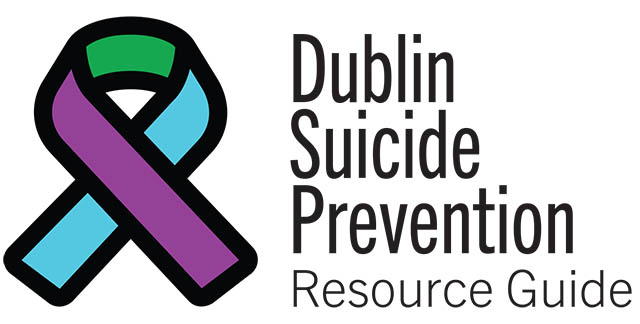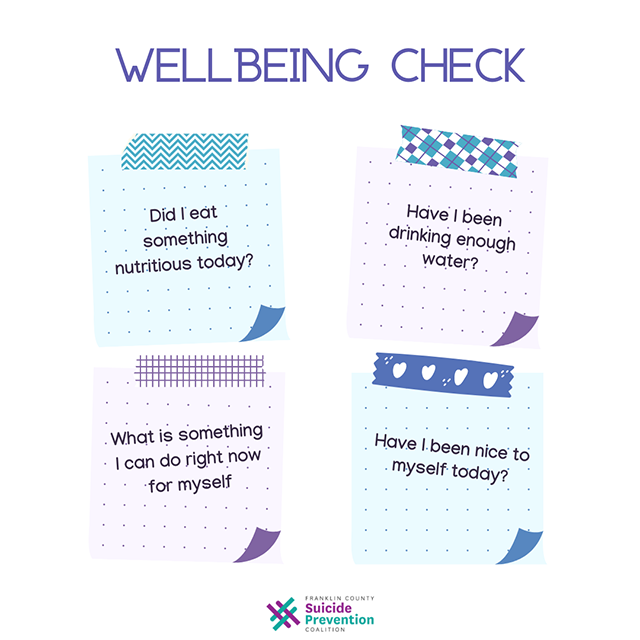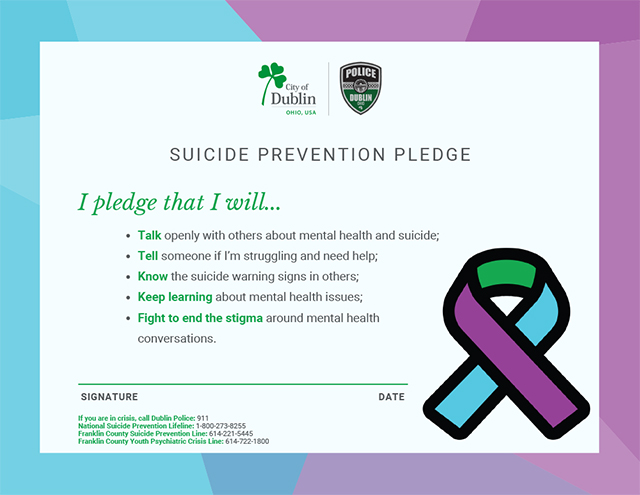
While suicide is a difficult public health crisis to talk about, it affects people across all cultures, populations and age groups. The City of Dublin and Dublin Police are committed to partnering with local mental health providers to offer residents a space to discuss suicide prevention as an important community conversation in Dublin as well as connect residents with the appropriate resources
4 Things for a Daily Mental Health Well-Being Check
Suicide Prevention Resource Guide
The City of Dublin and Dublin Police are proud to partner with local mental health providers to ensure Dubliners know who to talk to in a crisis. This digital Suicide Prevention Resource Guide connects you with local and regional organizations focused on providing mental health support to everyone in our community.
How to Speak with Someone about Suicide Prevention
The biggest myth about suicide is that if you talk with someone about suicide, it will put the idea in their head. It has the opposite effect, because candidly addressing suicide can make people realize that if they can talk about it, then maybe there’s another way to deal with the concerns they are having.
If someone is talking about suicide,
- Make sure they know they are not alone.
- Say something, such as, “This is really important, and I want to make sure you have the support you deserve. Can I go with you to talk to someone?”
- Don’t offer to keep someone’s suicidal thoughts a secret.
- If you have a concern about a person’s safety but don’t know how to talk to them directly, reach out to someone else.
Mindfulness — Being mindful goes a long way. Working to center yourself can help create good coping skills before you’re in crisis. Encourage yourself or someone who has had suicidal ideation to have a conversation about life when things are going well in order to build those skills.
What To Ask Someone Talking about Suicide
- If you are in crisis, call 911 to contact the Dublin Police
- Call National Suicide Prevention Lifeline: 1-800-273-8225
- The Lifeline provides 24/7, free and confidential support for people in distress, prevention and crisis resources
- If you can’t call, text the Crisis Text Line: 741741
- Connect with a crisis counselor 24/7 for free
Reducing Stigma in Dublin
Practice saying the words: “Are you thinking about suicide?”
- It’s not a comfortable thing to say, but it’s important to prepare yourself to be in the position to help others when necessary.
Sign the Dublin Suicide Prevention Pledge to commit to
- Talk openly with others about mental health and suicide
- Tell someone if I’m struggling and need help
- Know the suicide warning signs in others
- Keep learning about mental health issues
- Fight to end the stigma around mental health conversations
Youth Suicide Prevention Resources — Locks Save Lives
The Dublin Police has partnered with Columbus Public Health to distribute lock boxes to help limit access to lethal means in homes. Limiting access to lethal means, such as firearms and medications, is an effective way to save the life of someone who is experiencing a suicidal crisis.
Local Support Groups and Health Providers
Alcohol, Drug and Mental Health Board of Franklin County
ADAMH helps Franklin County residents find the right places to turn for affordable, quality alcohol, substance use disorder and mental health services. These services are provided by more than 35 not-for-profit contract agencies located in neighborhoods throughout the county.
Franklin County Suicide Prevention Coalition
The Franklin County Suicide Prevention Coalition (FCSPC) aims to increase communication, coordination, and collaboration efforts in Franklin County to prevent suicide and bring hope and support to those affected by suicide. The coalition bridges organizations together with the end goal of enhancing the overall success of collective suicide prevention efforts. These efforts include decreasing stigma, increasing awareness of available support, and coordinating suicide prevention training.
The FCSPC offers support to local businesses and organization with implementing the National Guidelines for Workplace Suicide Prevention. The FCSPC is hosted by Mental Health America of Ohio and funded by the Alcohol, Drug and Mental Health Board of Franklin County.
LOSS Community Services
LOSS Community Services is made up of both staff and a large number of volunteers, many of whom are survivors of a suicide loss. LOSS exists to offer hope to the bereaved, empowering them so they can thrive. LOSS provides resources, support and understanding immediately after a suicide loss and for the months and years that follow. LOSS also facilitates evidence-based suicide prevention training sessions.
Mental Health America of Ohio
Mental Health America of Ohio (MHAOhio) is an affiliate of Mental Health America, the country’s leading organization dedicated to helping all people live mentally healthier lives. MHAOhio supports the Central Ohio community by guiding people to mental health services that may not otherwise be accessible. MHAOhio believes in inclusivity and works with all people and their families through each step on the path to wellness, from making initial referrals, to providing free mental health services, to helping maintain stability and productivity once they are achieved.
Ohio Suicide Prevention Foundation
The Ohio Suicide Prevention Foundation (OSPF) is a not-for-profit organization that works to bring about changes in attitudes and perceptions surrounding suicide and its relationship to mental illness, alcohol and drug abuse, and other issues. OSPF supports community-based efforts that reduce stigma, promote education and increase awareness, resources and programs that lessen the risk of suicide. Resources available to businesses and organizations include mental health campaign materials and evidence-based training sessions.
Workplace Suicide Prevention
Workplace Suicide Prevention provides support with implementing the National Guidelines for Workplace Suicide Prevention. Businesses and organizations can receive support by pledging to take action and joining the national community of practice focused on workplace suicide prevention.



